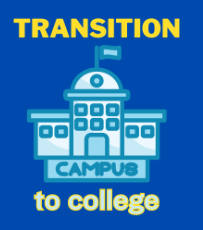Differences Between K-12 and College
The transition from high school to college is a significant one for all students, especially those with disabilities. Not only are the services for student with disabilities different, but the laws which protect their rights are different also. Students with disabilities in college courses are treated as adults (whether they have turned 18 yet or not), which means they will be expected to take on more responsibility.
Below are some of the key differences between K-12 and college:
| K-12 IDEA | K-12 504 PLAN | COLLEGE |
|---|---|---|
|
Student records are accessible to student and parents |
Student records are accessible to student and parents | Any enrolled college student's records are only accessible to the student. Information cannot be released to anyone, including the parent, without a written release by the student |
| Special consideration for behavior problems | Students must follow high school behavior code | Students are held to the Student Code of Conduct; no special consideration |
| District identifies disability | Parent provides documentation of disability | Student is responsible to provide documentation of disability and need for reasonable accommodations |
| Success is more of a right | No guarantee for student success | There is no guarantee for student academic success; student is responsible for own academic success |
| Special education classes are provided | Regular class curriculum with modification | No special education classes; disability support office's role is to accommodate student in college level classes |
| Free evaluation of disability | Parent is responsible for providing evaluation of disability | Student is responsible for disability evaluation |
| District develops Individual Education Plan (IEP) | Services determined by 504 Plan | Student initiates request for reasonable accommodations. There are no IEPs or 504s in postsecondary education |
| District ensures that the IEP is implemented | District/parent/student responsible | Student is responsible for own academic progress |
| Entitled services identified on the IEP | Services determined by 504 Plan | Providing reasonable accommodations is not an automatic process; each college determines eligibility and what reasonable accommodations will be provided based on the disability documentation provided |
| Fundamental modifications to program of study permitted as identified on IEP | Fundamental modifications to program of study permitted as identified in 504 Plan | No fundamental modifications allowed: Accommodations may not result in a fundamental alteration to a course or academic program; nor impose an undue burden on an institution |
| Teacher can advocate for student | Parent/student advocate | Student must advocate for oneself; parents have no contact with instructors |
| Personal services provided: e.g., transportation, personal attendant, nurse, in class aide | No personal services provided | No personal services provided |

As students make the transition from K-12 to college, it's crucial to recognize the shift in how support is provided through the academic journey. In college, the focus pivots towards empowering students to independently navigate services and take charge of their academic and career paths.
K-12: Building Foundations for Success
Focus on Student Success: K-12 education is centered around ensuring student success in a highly structured
environment.
IDEA and Section 504: These laws guarantee Free and Appropriate Education (FAPE) for students with disabilities,
leading to modification of instruction and curriculum.
Individualized Plans: Individualized plans guide student instruction and services, with coordination between
teachers and parents.
School-Based Services: Services are provided by the school district, including personal aide services arranged
by the school.
Highly Regimented Schedule: High school schedules are highly regimented, with routine communication between parents
and teachers.
College: Transition to Independence
Focus on Providing Student Access: College focuses on providing equal access through ADA and Section 504, without modifying
course objectives.
Student-Initiated Accommodations: Students initiate and request accommodations independently with documentation.
No Comparable Individual Education Plans: There are no comparable individual education plans, and students are responsible
for arranging accommodations.
Independent Responsibility: Students independently plan and manage their workload, facing unstructured schedules,
challenging homework, and heavy reading.
Limited Parent Contact: Limited parent contact with instructors is allowed, requiring FERPA consent, as students
must self-advocate and pursue campus resources independently.
Definitions:
- 504 Plan: A plan outlining accommodations and services for K-12 students with disabilities outside the special education process.
- IEP (Individual with Disabilities Education Act of 2004): Defines individualized objectives for K-12 students with disabilities and is reviewed annually.
- IDEA (Individuals with Disabilities Education Act of 2004): Federal legislation outlining the civil rights of K-12 students with disabilities.
- FERPA (Family Educational Rights and Privacy Act of 1974): FERPA gives parents certain rights with respect to their children's education records. When a student reaches 18 years of age OR attends an institution of postsecondary education at any age, the student becomes an “eligible student,” and all rights under FERPA transfer from the parent to the student. transferred are "eligible students."

Stay Connected